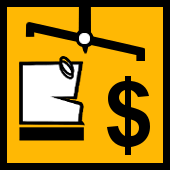Shortcomings of stimulation "through profit (turnover)"
The frequent wish of managers to pay “from the profit” or “from turnover” is understandable and on first glance, quite logical. In fact: we earned money — we can "share" with the employees, if we did not earn — there is no one to blame. This is especially typical for new companies/fields (although it should be noted that the Managers of large enterprises also often have these thoughts). Actually commercial enterprises often prefer to pay “from turnover” and manufacturing enterprises prefer to pay “from profit”.
There are also hypothetical speculations that the link to profit/turnover motivates employees. Arguments in favor of this assumption are already excessively published (on the net, in journals, in books) – so we shall not repeat them.
We shall do something else. Since this way to motivate has a variety of significant flaws which are almost not spoken of, but which are often faced by managers and entrepreneurs, we shall write only about them.
SHORTCOMING 1.
NOT CONSIDERING THE VALUE OF A DEAL AND ITS WORK-LOAD
ARE NOT INTERCONNECTED
Consequently,
1.1. A huge one-time (sometimes sudden) “turnover-making” order, does not bring further work-load, but the salary increases and, as a result, the employee relaxes.
And on the contrary. When the main work with the long-awaited Client just begins, and new applications are not forecasted, the employees want to “lawfully” know: why their salaries “fall” as compared to the last “profitable” month, though they are trying harder and wasting more time.
1.2. The employee unconsciously begins to dislike cheap products and services, tries to run away from working with them and consequently does the same in regards to Clients who buy such products. Thus, in some shops, at the tea/coffee (conditional) grinder stands, you might not at all find salespeople (unlike, for example, at the projection TV stand).
As a result, the bonus is "not transparent". The relation between salary and work efficiency is lost.
SHORTCOMING 2.
NOT CONSIDERING THE FACT THAT THE SALARY DOES NOT RELATE MUCH TO THE SIZE OF THE BUSINESS
Of course, a good employee can and should earn more and a bad one, less. However, the salary of analogous employees in other companies, as a rule, cannot differ much. It can differ by 20–30%, but not twice or thrice or even ten times more. However, the income of a big supermarket can differ much from the income “at the shop on the corner of the road”.
This means that when you make a business plan, it is necessary to consider the market cost of a specialist. And if it is such that there will be no profit, then, the entrepreneur should think about how fruitful his business idea is and should not hang his entrepreneurial task on his employees ("No profit – no salary").
Note (here and below): in the “percentage model" of a company, one can find many shortcomings on the spot (see below). That is why you can find the same typical examples in different sections of the article.SHORTCOMING 3.
NOT CONSIDERING THE MARKET VALUE OF A SPECIALIST AND THE UNCONSCIOUS LOSS OF FUNCTIONS
OF THE MANAGEMENT
There are specific professions and each has its value on the labor market. There are tasks that we charge to fulfill, as the Managers. And there is a cost which we pay for the fulfillment of these tasks. There is also a question which we always ask ourselves: "How much is this specialist paid on the market?" These are precisely the data which should be the point of reference when we take a decision concerning the salary. This means that, you should orientate yourself with the market value of the specialist, irrelevant on the profit made by Your Company.
An employee at a factory can grind out a component. And this component may be expensive or cheap, a deficiency or a knockdown, contain gold or steel… But he will go to another factory if there he will be paid more for а similar job (as if the component from either factory is not sold).
And in order to hold an excellent employee, You will certainly have to pay him a little bit more than the average market value. And a bad employee should be paid less (but not too little, or it will be better to fire such a bad employee than to support a low-paid loser).
Either way, it is the responsibility of the Entrepreneur to make the “reason for profit” in specific market conditions. Actually that is why the Entrepreneur personalizes the profit as a result of his own actions. Thereat, the result of the action of, let’s say, an administrator, a well-trained dealer, salesperson, is to service a Client well, and that of a storekeeper is to submit the goods from the store on time.
And if the company suffers loss (a business is still a business), we cannot refuse to pay (or only partially pay) the person, who did his job (and he is not to be blamed for this loss)?
A Company which is functioning normally sells its products according to its price list and does not wish to receive money “from the profit” of the Client. That is, the Company prefers to receive a specific sum for the products evaluated by itself and the market. AND THIS IS CORRECT!
But a Company which is functioning normally, should not rely on the fact that its employees think otherwise.
SHORTCOMING 4.
NOT CONSIDERING THE TREND OF THE MARKET
The profit on services (goods) fall when competition increases, and the average market salaries often (for the same increase in competition) rises. And, since the two are not related to each other, those who want to pay out “from profits” have to fit artificially.
And there is just no logical explanation.
SHORTCOMING 5.
THE STIMULATION OF “ANGELS” AND NOT PEOPLE
It is important not to replace the thesis about the "magical formula of motivation" (for example in the form of "correct percentage"), from which usually, the employee himself turns into an "angel" and "spreads his wings" himself (and it is crucial to find this "magical formula").
Once, Roosevelt, who read Karl Marx, was asked whether he liked Marxism. Roosevelt then answered: "It’s a lovely theory. However, it is meant for angels".
We start with the simple and reasonable principle that: a real business is to be built not on “angels” but on “what you already have”. And You have to build a system, which would work efficiently with “usual” employees. Of course, it would be great if You had unusual employees, You shall notice them right away and encourage them. But the planning of a system and the setting up of rules of management should be based on “usual” employees, most of whom, will work “without tension” if they receive a “percentage salary”. And they will most probably not increase their own workload and quality and start inquiring not only about "the fairness of the enterprise", but also about the margins, the payments from Clients, argue about the cost of different services and suspect You in sins never committed.
SHORTCOMING 6.
UNCONSCIOUS OBLIVION OF TECHNOLOGY
You should also not forget about the following: for simple equal conditions, there is a maximum plank, which the employee (who works in a specific way or method, and follows specific principles etc.) shall not cross, no matter how much he is paid. Excess payment, in this case, will only make the employee relax.
In the same way, world records in high jump for the last 30 years has increased by 15 cm and in the next 30 years it will increase by 10 more cm (though the salary of jumpers have increased a few dozen times).
Another example: According to the data of "RTR-sport", Russian football players who play in the national leagues in half-empty stands, who were shamed in the European Championships and lost by a score of 1:7 against the team of Portugal, however, received from 400 000 to 730 000 coins of account each for the shameful year 2004. The "plank of the Russian team" is perfectly understandable.
The Entrepreneur should define the technological limits of his business (in such a way that he now has).
For example, an employee (or brigade) who is actively and professionally selling "will give" more revenue than a passive one. And by counting the results, You should find the difference. But in a well-organized business, the variations in sales are within reasonable limits.
If there still are variations in effectiveness, (depending on efforts) a big one (more than 20%), then this shows “holes” in the technology of sales. This problem should be solved first, and then you can return to the salary.
SHORTCOMING 7.
WITH A “PERCENTAGE SYSTEM” OF SALARY (“FROM PROFIT”, “FROM TURNOVER”) THE PRODUCTIVITY IS “SPONTANEOUSLY” SET BY YOUR EMPLOYEES
This is an illustration of how employees set up a standard if it was not done by the Manager.
EXAMPLE
(model)- The number of employees — 5 people
- A salary which is enough for the employee, "without overworking himself" — USD 260.
- Percentage of the turnover, paid to the employees — 10% (for example)
- "Spontaneous" wages fund — 1 300.
- "Standard" on turnover, spontaneously rated by the employees of the enterprise — USD 13 000.
We can believe in the fact that “there is no standard” and “people are trying”, but it is better to set target-standards to Your business (by managing the business with ideas and parameters of a business plan and not the wishes of employees) and organize the work in such a way that usual people might reach them without making selfless deeds. The know-how of organizing the work is the ability of the Manager and Entrepreneur.
The opposite is also true: while running away from this organizational work, in replacing it with the thesis about “the magical formula of motivation” in wich a usual employee turns into an “angel” (see above), is the well-known laziness of the Management and the numerous “piecework theories and self-satisfaction from them" — are just philosophical justifications of this laziness.
SHORTCOMING 8.
"A PERCENTAGE MODEL" (FOR A LOW ORDER RATE) "HIDES" A LAYUP AT WORK
It is wrong. After normalizing the work, a “layup” should be honestly marked out.
And at last,
SHORTCOMING 9.
"THE PERCENTAGE MODEL" "BLURS" THE CONTRIBUTION OF A PARTICULAR EMPLOYEE
Since, a wide variety of factors affect the profit/turnover, the relation between salary and efficiency of work is NOT noticeable. The bonus, in this case, is “NOT transparent”. It just becomes some strange number, the source of which is NOT understandable to the employee.
SUMMARY:
According to the author, the 9 above-mentioned shortcomings are enough to come to the conclusion that: "despite the numerous spells on the topic, % of profit/turnover does not healthily relate to motivation".
The Authors thank K. Tkalich ("TRIZ-CHANCE" system) for her help in writing this article.The Authors thank their Colleague on the Forum www.triz-ri.ru/forum for the productive conversation on the topic.










